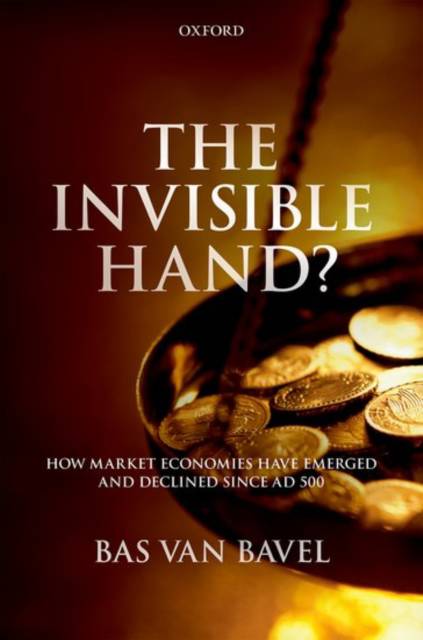
Door een staking bij bpost kan je online bestelling op dit moment iets langer onderweg zijn dan voorzien. Dringend iets nodig? Onze winkels ontvangen jou met open armen!
- Afhalen na 1 uur in een winkel met voorraad
- Gratis thuislevering in België vanaf € 30
- Ruim aanbod met 7 miljoen producten
Door een staking bij bpost kan je online bestelling op dit moment iets langer onderweg zijn dan voorzien. Dringend iets nodig? Onze winkels ontvangen jou met open armen!
- Afhalen na 1 uur in een winkel met voorraad
- Gratis thuislevering in België vanaf € 30
- Ruim aanbod met 7 miljoen producten
Zoeken
The Invisible Hand?
How Market Economies Have Emerged and Declined Since AD 500
Bas Van Bavel
Hardcover | Engels
€ 75,95
+ 151 punten
Uitvoering
Omschrijving
The Invisible Hand? offers a radical departure from the conventional wisdom of economists and economic historians, by showing that 'factor markets' and the economies dominated by them -- the market economies -- are not modern, but have existed at various times in the past. They rise, stagnate, and decline; and consist of very different combinations of institutions embedded in very different societies. These market economies create flexibility and high mobility in the exchange of land, labour, and capital, and initially they generate economic growth, although they also build on existing social structures, as well as existing exchange and allocation systems. The dynamism that results from the rise of factor markets leads to the rise of new market elites who accumulate land and capital, and use wage labour extensively to make their wealth profitable. In the long term, this creates social polarization and a decline of average welfare. As these new elites gradually translate their
economic wealth into political leverage, it also creates institutional sclerosis, and finally makes these markets stagnate or decline again. This process is analysed across the three major, pre-industrial examples of successful market economies in western Eurasia: Iraq in the early Middle Ages, Italy in the high Middle Ages, and the Low Countries in the late Middle Ages and the early modern period, and then parallels drawn to England and the United States in the modern period. These areas successively saw a rapid rise of factor markets and the associated dynamism, followed by stagnation, which enables an in-depth investigation of the causes and results of this process.
economic wealth into political leverage, it also creates institutional sclerosis, and finally makes these markets stagnate or decline again. This process is analysed across the three major, pre-industrial examples of successful market economies in western Eurasia: Iraq in the early Middle Ages, Italy in the high Middle Ages, and the Low Countries in the late Middle Ages and the early modern period, and then parallels drawn to England and the United States in the modern period. These areas successively saw a rapid rise of factor markets and the associated dynamism, followed by stagnation, which enables an in-depth investigation of the causes and results of this process.
Specificaties
Betrokkenen
- Auteur(s):
- Uitgeverij:
Inhoud
- Aantal bladzijden:
- 320
- Taal:
- Engels
Eigenschappen
- Productcode (EAN):
- 9780199608133
- Verschijningsdatum:
- 7/09/2016
- Uitvoering:
- Hardcover
- Formaat:
- Genaaid
- Afmetingen:
- 236 mm x 157 mm
- Gewicht:
- 657 g

Alleen bij Standaard Boekhandel
+ 151 punten op je klantenkaart van Standaard Boekhandel
Beoordelingen
We publiceren alleen reviews die voldoen aan de voorwaarden voor reviews. Bekijk onze voorwaarden voor reviews.











